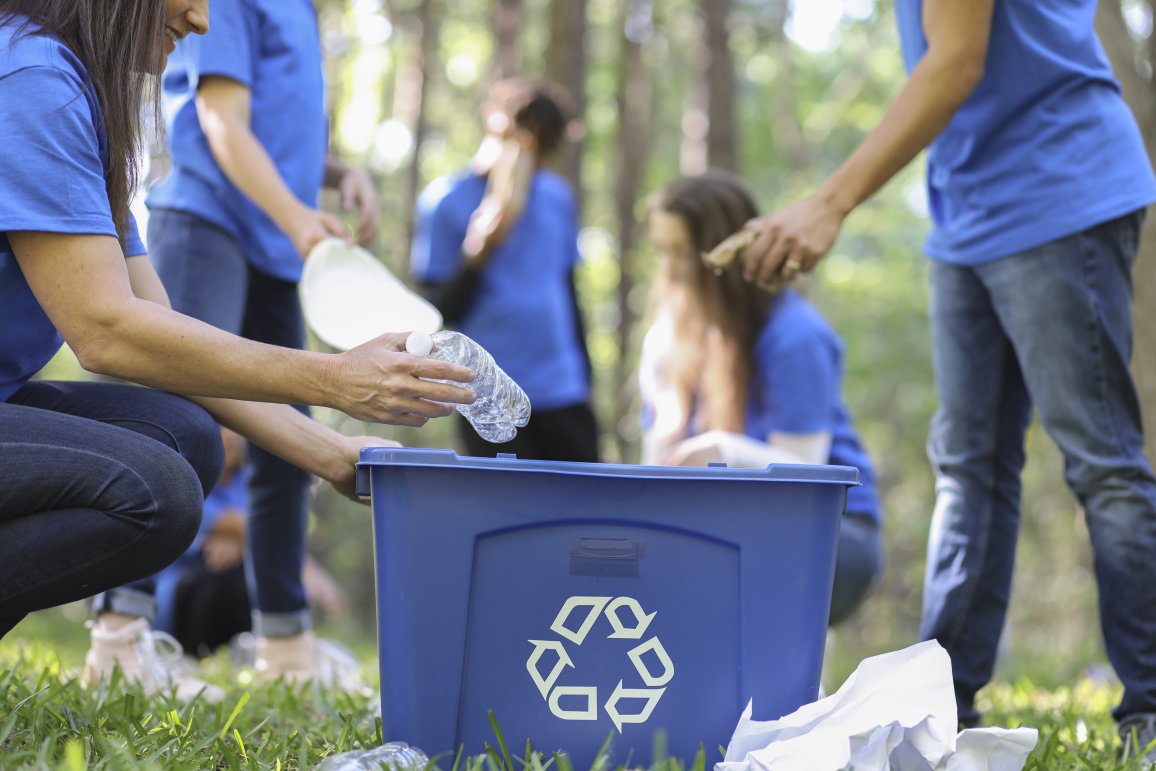Making waste a mainstream issue
Plogging, rubbish challenges and clean-up days – these are all mass movements against waste. There is an abundance of waste in the world, but the focus of clean-up movements is typically the fight against plastic, symbolised in particular by the collection of old plastic bottles. So should we stop using plastic? A study has produced a different finding: we would need more packaging if plastic packaging were to be replaced by alternatives. Furthermore, plastic makes a bigger contribution towards a cleaner world than many people think.

Producing less waste and ridding the world of rubbish accumulations – this is now becoming an increasingly important issue for politicians and the general public. Plastic waste has a central role to play in this – albeit in a positive, not negative, way.
Raising awareness and promoting the circular economy through plastic
Images of large mounds of plastic waste have a significant impact in that they make waste the focus of public attention. This should lead to a better understanding of effective disposal and innovative recycling techniques, rather than to an aversion to plastic. After all, plastic is one of the most flexible materials there is. Without plastic, we are not living in a modern world. And waste becomes a problem when it is treated wastefully, or carelessly. With this in mind, it is fascinating to learn that up to 20 per cent more packaging, and therefore more waste, would need to be produced if 10 per cent of plastic packaging were replaced by alternative materials – as documented in a recent study by the packaging market research company GVM (Gesellschaft für Verpackungsmarktforschung) [1].
However, plastic is not only a sophisticated material that makes products accessible to the poorer parts of society thanks to its low manufacturing costs, but is also future-orientated when disposed of correctly. The recovery of reusable materials – which only really became widespread with plastic waste – is driving the circular economy forward, including advances in material efficiency, recycling and conversion technologies.
Material and thermal recovery systems are among the most environmentally sustainable ways of dealing with plastic waste. Here, old products are transformed into new ones, or waste is converted into energy, a process known as waste-to-energy. For example, the recently passed Building Energy Act (GEG – Gebäudeenergiegesetz) in Germany even puts waste heat from thermal waste treatment on a level with renewable energies like wind and solar energy for the operation of heating systems. Also, British scientists have succeeded in producing the flavouring agent vanillin from PET plastic with the aid of intestinal bacteria (E. coli) [2]. The researchers note that this is an important step in the sustainability of plastic and a milestone for the possibilities afforded by synthetic biology [3].
Mass trends, clean-up days and social initiatives having an impact
In addition to advances in material and thermal recycling, increasing numbers of consumers are getting involved in waste collection. Awareness is a keyword and a lifestyle trend that is responsible for the creation of many waste disposal campaigns. In the case of ‘plogging’, joggers pick up litter while running. There are also similar ideas in the form of ‘plalking’ and ‘pliking’, whereby walkers and hikers pick up litter as they go. Social media users and influencers get involved in and organise rubbish challenges. International and local clean-up events, such as World Cleanup Day, are seeing record numbers of participants. The next such event takes place on 20 September 2024.
In the fight against waste, it is important that attention also be drawn to the cause of waste – not the material, but how it is treated. For example, studies conducted in the Great Pacific garbage patch, the world’s largest rubbish vortex, show that 75 to 86 per cent of plastic waste in the sea can be traced back to the fishing industry [4].
However, there are also some positive developments to mention here. In places where there is a lack of regulated waste disposal structures, initiatives are being developed that turn plastic waste into a barter good, and thus a source of income. One example is Plastic Bank and its idea of ‘Social Plastic’. Another is IMER: a joint venture in Mexico involving the Austrian packaging manufacturer ALPLA, where plastic waste is purchased from local collectors and collected using ALPLA’s own trucks. Furthermore, the process of ‘ecobricking’ transforms plastic bottles into sustainable building materials that can be used in houses and furniture [5].
The German-South African joint project ‘EcoBrick Exchange’ is even building schools in this way and has received multiple awards for this, including the Climate Change Award Cape Town, the SEED Award from the United Nations, and the Architecture for Social Gain award [6]. Plastic is therefore a valuable material in every phase of its existence.
[2] https://pubs.rsc.org/en/content/articlelanding/2021/GC/D1GC00931A#!divA…
[3] https://www.chemie.de/news/1171462/bakterien-als-schmackhafte-loesung-f…
[4] https://theoceancleanup.com/updates/the-other-source-where-does-plastic…
Do you like our texts? Perhaps even so much that you want to use them in your own media? Then please get in touch with us beforehand!
